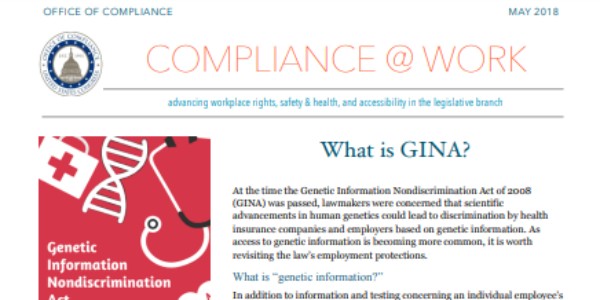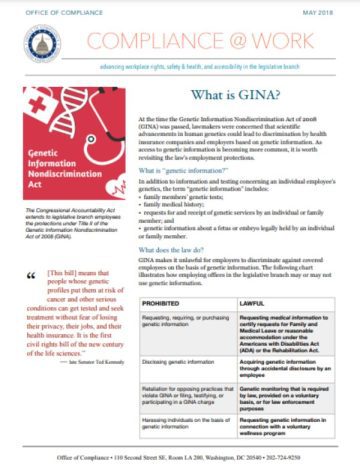What is GINA?
At the time the Genetic Information Nondiscrimination Act of 2008 (GINA) was passed, lawmakers were concerned that scientific advancements in human genetics could lead to discrimination by health insurance companies and employers based on genetic information. As access to genetic information is becoming more common, it is worth revisiting the law’s employment protections.
What is “genetic information?”
In addition to information and testing concerning an individual employee’s genetics, the term “genetic information” includes:
- family members’ genetic tests;
- family medical history;
- requests for and receipt of genetic services by an individual or family member; and
- genetic information about a fetus or embryo legally held by an individual or family member.
GINA makes it unlawful for employers to discriminate against covered employees on the basis of genetic information. The following chart illustrates how employing offices in the legislative branch may or may not use genetic information.
GINA violations are rarely isolated incidents
Genetic discrimination is often accompanied by other types of discrimination. The CAA incorporates Title VII of the Civil Rights Act, which prohibits discrimination on the basis of race, color, religion, sex, or national origin. All personnel actions, such as hiring, discharge, promotion, pay, or benefits, must be free from discrimination. An individual is also entitled to discrimination or harassment protection under the CAA if they are a qualified individual with a disability as defined by the ADA or the Rehabilitation Act. These laws prohibit asking disability-related questions before a job offer is made.
Enforcement
The CAA requires that requests for counseling be brought to the OOC within 180 days after the alleged GINA violation. After the required period of counseling and mediation, an eligible employee may file an administrative complaint with the OOC or proceed with a civil action in federal district court.

